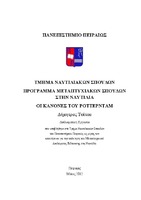| dc.contributor.advisor | Γκιζιάκης, Κωνσταντίνος | |
| dc.contributor.author | Τσίτσα, Δήμητρα Γ. | |
| dc.date.accessioned | 2013-04-11T07:45:47Z | |
| dc.date.available | 2013-04-11T07:45:47Z | |
| dc.date.issued | 2013-04-11T07:45:47Z | |
| dc.identifier.uri | https://dione.lib.unipi.gr/xmlui/handle/unipi/5327 | |
| dc.description.abstract | Το παρόν πόνημα αποτελεί μια προσπάθεια παρουσίασης της νέας σύμβασης των Κανόνων του Ρόττερνταμ και των νέων άρθρων της. Απαραίτητη κρίνεται η συγκριτική ανάλυση των προϋπαρχόντων Κανόνων της Χάγης - Βίμσπυ με τους Κανόνες του Ρόττερνταμ με σκοπό να αναδειχθούν οι διαφορές τους. Ειδικότερα, η εργασία ξεκινά με την ιστορική επισκόπηση του νομοθετικού πλαισίου ρύθμισης του διεθνούς εμπορίου διά θαλάσσης για να φτάσει στους λόγους που ώθησαν την διεθνή ναυτιλιακή κοινότητα να δημιουργήσει το εκσυγχρονισμένο καθεστώς των Κανόνων του Ρόττερνταμ. Ακολουθεί η παράθεση των άρθρων των Κανόνων της Χάγης - Βίσμπυ σε αντιπαραβολή με τα νέα άρθρα των Κανόνων του Ρόττερνταμ. Σκοπός αυτής της σύγκρισης είναι να διαφανεί η εξέλιξη που επέρχεται από τους Κανόνες της Χάγης - Βίσμπυ σ' αυτούς του Ρόττερνταμ σε ζητήματα, όπως οι αρμοδιότητες των συμβαλλομένων μερών, η ευθύνη και τα δικαιώματα που υπέχουν κατά την μεταφορική διαδικασία, αλλά και η έκδοση εγγράφων μεταφοράς. Στα δύο τελευταία κεφάλαια της εργασίας παρουσιάζονται καινοτομίες των Κανόνων του Ρόττερνταμ, όπως η πρόβλεψη για τις συνδυασμένες μεταφορές, τα ηλεκτρονικά έγγραφα μεταφοράς, η γεωγραφική επέκταση παράδοσης των εμπορευμάτων και η νέα έννοια του κυρίαρχου συμβαλλόμενου μέρους. Στο έκτο κεφάλαιο περιέχονται αλλά θέματα που ενώ προβλέπονταν στους Κανόνες του Αμβούργου εξελίσσονται στο νέο καθεστώς με νέες προσθήκες ή απαντώνται πρώτη φορά. Έτσι, ο αναγνώστης, όπως ξεδιπλώνεται το νέο καθεστώς, αναγνωρίζει την επιβεβλημένη ανάγκη εκσυγχρονισμού και ενσωμάτωσης των νέων Κανόνων του Ρόττερνταμ στις εθνικές νομοθεσίες με σκοπό την βελτίωση της διεθνούς ναυτιλίας. | |
| dc.language.iso | el | |
| dc.rights | Αναφορά Δημιουργού-Μη Εμπορική Χρήση-Όχι Παράγωγα Έργα 4.0 Διεθνές | |
| dc.rights.uri | http://creativecommons.org/licenses/by-nc-nd/4.0/deed.el | |
| dc.subject | Ναυτιλία -- Δίκαιο και νομοθεσία | |
| dc.subject | Διεθνές εμπόριο | |
| dc.subject | Θαλάσσιες μεταφορές | |
| dc.subject | Ναύλωση και ναύλος | |
| dc.title | Οι κανόνες του Ρόττερνταμ | |
| dc.type | Master Thesis | |
| europeana.isShownAt | https://dione.lib.unipi.gr/xmlui/handle/unipi/5327 | |
| dc.identifier.call | 343.096 ΤΣΙ | |
| dc.description.abstractEN | The current essay is an attempt to present the new contract of the Rotterdam Rules and its new articles. The comparative analysis of pre-existing rules of the Hague-Visby with the rules of Rotterdam is considered necessary in order to highlight their differences. Specifically, the dissertation begins with the historical overview of the legal regulation of the international trade by sea and concludes with the reasons for which the international maritime community has created the updated status of the Rotterdam Rules. The next following topic of the current analysis is the presentation of the Hague-Visby Rules articles versus the new articles of the Rotterdam Rules. The purpose of this comparison is to demonstrate the pending improvement in Rotterdam Rules in contrast with the Hague-Visby Rules, on issues such as the responsibility of the parties, liabilities and rights imposed during the carriage of the cargo, but also the issuance of documents transport. The last two chapters of the study analyzes innovative regulatory issues of the Rotterdam Rules such as combined transport, electronic transport documents, the geographical extension of delivery of goods and the new concept of the 'controlling party'. The sixth chapter deals with other issues some of which are pre-existed in the Hamburg Rules, but for the first time are enriched with new regulations by the new contract. Thus, as it unfolds the new regime in this analysis, the reader realizes the imperative need to modernize the obsolete regulations and integrate the new rules of Rotterdam in national legislation in pursuing the development of international shipping. | |



